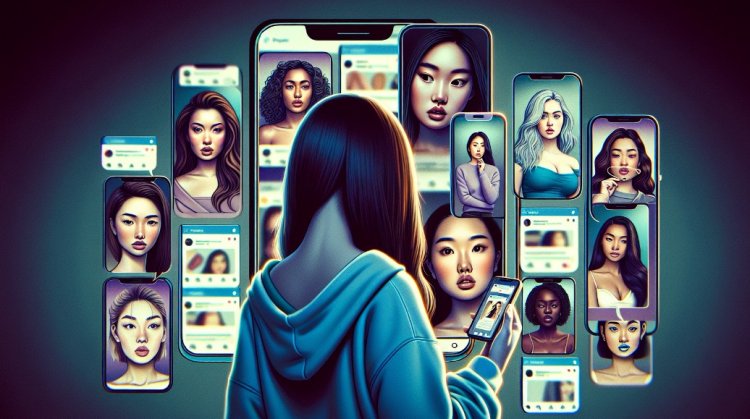Navigating Social Media and Body Image: The Impact on Young Women
"Explore the complex relationship between social media and body image in 'Navigating Social Media and Body Image: The Impact on Young Women.' This insightful article examines how online platforms influence self-perception and body confidence among young women, highlighting the need for positive change."

Introduction
-
The rise of social media and its impact on body image
-
Increased insecurity among young women
-
The power of images and the influence of social media
-
The pressure on women in society
With the advent of social media, the impact on body image among young women has become more profound. Constant exposure to carefully curated images on platforms like Instagram has led to increased insecurity and feelings of inadequacy. The power of images cannot be underestimated, as they fuel mutual comparisons and evaluations. Women, especially young girls, tend to focus on what they lack or do not have, leading to a rise in insecurity.
Social media has amplified the pressure on women in society, as the female body has long been central to women's identity. The images portrayed on social media platforms set unrealistic beauty standards, causing women to feel like they can never measure up. This constant comparison and the pursuit of an ideal image can be destructive, leading to feelings of depression and a negative impact on mental health.
It is essential to recognise the influence of social media on body image and work towards promoting a more positive and inclusive representation of beauty. By embracing diversity and encouraging self-acceptance, we can help young women develop a healthier relationship with their bodies and combat the negative effects of social media.
The Influence of Social Media
-
Young women's focus on what they lack
-
The impact of social media on body image
-
The amplification of insecurities
-
Effects on young people who are still finding their identity
Social media has had a significant influence on young women and their perception of body image. With platforms like Instagram, young women are constantly exposed to carefully curated images that often depict unrealistic beauty standards. This constant exposure has led to increased insecurity and feelings of inadequacy.
One of the major issues is that young women tend to focus on what they lack or do not have, leading to a rise in insecurities. Women compare themselves to others and assess their own self-worth as a result of these comparisons, which amplifies the comparison culture fostered by social media.
The pressure to conform to societal beauty standards has always existed, but social media has intensified this pressure. The images portrayed on these platforms set unrealistic expectations, causing young women to feel like they can never measure up. This constant pursuit of an ideal image can be destructive, leading to feelings of depression and negatively impacting mental health.
Furthermore, social media has a significant impact on young people who are still in the process of finding their identity. Being bombarded with images that depict a narrow definition of beauty can make it difficult for young individuals to fully accept and embrace themselves. The pressure to conform can hinder their journey of self-discovery and self-acceptance.
It is crucial to recognise the influence of social media on body image and work towards promoting a healthier and more positive representation of beauty. By embracing diversity and encouraging self-acceptance, we can help young women develop a healthier relationship with their bodies and combat the negative effects of social media.
The pressure on women
-
The central role of the female body in women's identity
-
The historical context of the pressure on women's bodies
-
The effects of social media on body image
-
The need for positive female role models
Women have long faced immense pressure when it comes to their bodies, and this pressure has only been amplified by the rise of social media. The female body has historically played a central role in women's identity, with societal expectations placing great importance on physical appearance. This has led women to constantly compare themselves to unrealistic beauty standards.
Social media has significantly contributed to the pressure on women's bodies. Platforms like Instagram showcase carefully curated images that often depict unattainable beauty ideals. Constant exposure to these images can lead to increased insecurity and feelings of inadequacy. Young women, in particular, are vulnerable to these negative effects as they are still in the process of finding their identity.
Furthermore, social media platforms have fostered a culture of comparison and evaluation. Women tend to focus on what they lack or do not have, perpetuating feelings of self-doubt. The pursuit of an ideal image can become destructive, leading to mental health issues such as depression.
It is crucial to address the impact of social media on body image and promote a more positive and inclusive representation of beauty. This includes the need for positive female role models who celebrate diversity and encourage self-acceptance. By embracing our differences and rejecting unrealistic beauty standards, we can help young women develop a healthier relationship with their bodies and counteract the negative effects of social media.
The Thin Ideal and Extreme Body Standards
-
The obsession with thinness and its impact on body image
-
Thinspiration and the dangers of extreme weight loss
-
Compulsive behaviours and their effects on mental health
-
The importance of seeking help and therapy
The pursuit of the thin ideal and extreme body standards has had a significant impact on body image and mental health. Society's obsession with thinness has led to increased insecurity and feelings of inadequacy among young women. The constant exposure to carefully curated images on social media platforms like Instagram has fueled mutual comparisons and evaluations, causing women to focus on what they lack or do not have.
Thinspiration, a term used to describe content that promotes extreme weight loss, poses significant dangers to individuals. The pressure to achieve an unrealistic and often unattainable body can lead to severe physical and psychological consequences. Engaging in extreme weight-loss practices can result in malnutrition, organ damage, and even death. It is essential to recognise the dangers of thinspiration and discourage its promotion.
Compulsive behaviours, such as excessive exercise, strict dieting, and unhealthy restriction of food intake, can have detrimental effects on mental health. These behaviours often stem from a distorted perception of one's body and a deep dissatisfaction with one's appearance. Engaging in such behaviours can lead to the development of eating disorders, anxiety, and depression.
Seeking help and therapy is crucial for individuals struggling with body image issues and extreme body standards. Therapy can provide support, guidance, and strategies for developing a healthier relationship with one's body. Therapists can help individuals challenge societal beauty ideals and foster self-acceptance. Individuals need to reach out and seek professional help when struggling with body image and mental health issues.
The Rise of Body Positivity
-
The emergence of body-positive influencers
-
The impact of following diverse body types on social media
-
Finding comfort and inspiration in relatable role models
-
Challenging beauty standards and embracing diversity
In recent years, there has been a significant rise in the body positivity movement, which aims to promote self-acceptance and challenge societal beauty standards. The emergence of body-positive influencers on social media platforms like Instagram has fueled this movement.
These influencers, who come in all shapes, sizes, and backgrounds, have played a crucial role in promoting body acceptance. By sharing their own journeys of self-love and celebrating their bodies, they inspire others to embrace their own unique beauty. Their honest and vulnerable posts create a sense of relatability and show that beauty comes in many forms.
One of the most powerful aspects of following diverse body types on social media is the impact it has on one's own body image. Constant exposure to diverse representations of beauty helps to challenge the narrow beauty standards perpetuated by the media. Seeing people with different body shapes and sizes confidently embrace themselves can help individuals develop a healthier relationship with their own bodies.
Finding comfort and inspiration in relatable role models is another significant aspect of the body positivity movement. By following influencers who share similar experiences or body types, individuals can feel a sense of belonging and realise that they are not alone in their struggles with body image. This sense of community can provide comfort and encouragement on their journey towards self-acceptance.
The body positivity movement also aims to challenge the beauty standards that have long been imposed on women. By embracing diversity and celebrating all body types, the movement seeks to create a more inclusive representation of beauty. It recognises that beauty is subjective and should not be limited to a narrow ideal. By embracing diversity, we can dismantle the harmful beauty standards that have perpetuated feelings of insecurity and inadequacy.
Fitness Culture and the New Beauty Standards
-
The rise of fitness as a beauty ideal
-
The pressure of maintaining a low body fat percentage
-
The association of slimness with effort and status
-
The influence of social media on fitness culture
In recent years, fitness has emerged as a new beauty ideal, heavily influenced by social media. With platforms like Instagram, individuals, especially young women, are constantly exposed to carefully curated images of fit and toned bodies. This rise in fitness as a beauty standard has had a significant impact on body image and self-esteem.
One of the main pressures of this fitness culture is the need to maintain a low body fat percentage. Many women feel the need to constantly monitor their calorie intake and engage in intense exercise routines to achieve the desired slim and toned physique. The pursuit of a low body fat percentage can become overwhelming and lead to feelings of inadequacy if one fails to meet these standards.
Slimness has become associated with effort and status in our society. The belief that being thin requires hard work and discipline has led to the perception that slim individuals are more successful and worthy of admiration. This association places additional pressure on individuals to conform to these beauty standards, often at the expense of their mental and physical well-being.
Social media has played a significant role in shaping fitness culture. Influencers and fitness models on platforms like Instagram have popularised the idea that fitness is attainable for everyone. However, it is important to recognise that social media often presents an idealised and unrealistic version of fitness. These images can create unrealistic expectations and fuel feelings of inadequacy among individuals striving to achieve the same level of fitness.
The Dark Side of the Beauty Industry
-
The objectification of women in the beauty industry
-
Sexual harassment and exploitation in the modelling world
-
The pressure to conform to unrealistic beauty standards
-
The need for change and transparency in the industry
The beauty industry has a dark side that often goes unnoticed. From the objectification of women to the pressure to conform to unrealistic beauty standards, there are many issues plaguing the industry.
The Objectification of Women
Women in the beauty industry are often treated as objects, valued solely for their appearance. This objectification not only diminishes the worth of women, but also perpetuates harmful stereotypes and unrealistic beauty ideals. It reinforces the idea that a woman's value is based on her physical appearance rather than her intelligence, skills, or character.
Sexual Harassment and Exploitation in the Modelling World
Reports of sexual harassment and exploitation have long plagued the modelling industry. Models, especially young and aspiring ones, are often subjected to inappropriate advances, coercion, and abuse. A power dynamic that favours those in positions of authority and leaves models feeling vulnerable and powerless is what fuels this exploitation.
The Pressure to Conform to Unrealistic Beauty Standards
The beauty industry sets unrealistic beauty standards that are nearly impossible for the average person to achieve. From airbrushed images to heavily edited photos, the industry presents an unattainable image of beauty. This pressure to conform can lead to low self-esteem, body image issues, and even dangerous behaviours such as extreme dieting and excessive exercising.
The need for change and transparency in the industry
There is a pressing need for change and transparency in the beauty industry. Companies should strive to promote diversity, inclusivity, and body positivity. They should reject harmful beauty standards and instead celebrate all types of beauty. Additionally, there should be more accountability and regulation to prevent sexual harassment and exploitation in the modeling world.
By addressing these issues and working towards a more ethical and inclusive industry, we can create a healthier and more empowering environment for women. We must challenge the harmful practices and norms that have perpetuated insecurity and inequality in the beauty industry.
The Role of Social Media and Self-Image
-
The impact of social media on self-image
-
The obsession with perfection and the culture of comparison
-
The importance of building real-life relationships
-
Being aware of the dangers of excessive social media use
Social media has a significant impact on self-image, particularly among young women. The constant exposure to carefully curated images on platforms like Instagram has fueled increased insecurity and feelings of inadequacy. The power of images cannot be underestimated, as they often lead to mutual comparisons and evaluations.
One of the major issues with social media is the obsession with perfection and the culture of comparison. Women, especially young girls, tend to focus on what they lack or do not have, leading to a rise in insecurities. The constant pressure to measure up to unrealistic beauty standards portrayed on social media can be detrimental to self-esteem and mental health.
While social media can provide a sense of connection and community, it is important to recognise the importance of building real-life relationships. Spending excessive amounts of time on social media can lead to isolation and a lack of meaningful connections. It is crucial to balance online interactions with face-to-face interactions and prioritise nurturing real-life relationships.
Furthermore, it is essential to be aware of the dangers of excessive social media use. Spending too much time on social media can contribute to feelings of depression and anxiety and harm mental health. It is important to set boundaries and prioritise self-care by engaging in activities that promote overall well-being.
Finding Strength and Self-Acceptance
-
The importance of self-acceptance and self-love
-
Navigating societal pressures while staying true to oneself
-
The need for a balance between self-determination and societal influence
-
Supporting each other and promoting a positive body image
Self-acceptance and self-love are crucial in navigating the impact of social media on body image. It is important to recognise that beauty comes in all shapes, sizes, and forms. Embracing diversity and celebrating our unique beauty can help build a healthier relationship with our bodies.
Societal pressures can often make it challenging to stay true to oneself. However, it is essential to prioritise our own well-being and happiness over external expectations. By setting boundaries and embracing our individuality, we can create a sense of empowerment and authenticity.
Finding a balance between self-determination and societal influence is key. While it is important to be aware of societal beauty standards, it is equally important to prioritise our own values and beliefs. By critically evaluating the messages we receive from social media and society, we can make informed choices about what aligns with our personal well-being.
Supporting each other and promoting positive body image is crucial to creating a more inclusive and accepting society. By celebrating diversity and challenging unrealistic beauty standards, we can foster a culture of acceptance and self-love. It is important to uplift and empower one another, creating a supportive community that embraces all body types and encourages self-acceptance.
Conclusion
-
Gratitude for our bodies and taking care of ourselves
-
The complexity of beauty and the need for emotional care
-
The ongoing challenge of navigating social media and body image
-
The strength of the young generation in driving change
In conclusion, it is important to express gratitude for our bodies and prioritise taking care of ourselves. Our bodies are incredible and carry us through life, and we should appreciate them for all they do.
The concept of beauty is complex and goes beyond physical appearance. It is important to recognise the need for emotional care and self-acceptance. Beauty comes from within, and embracing our own unique qualities is key to developing a healthier relationship with our bodies.
Navigating social media and body image will continue to be a challenge, but it is crucial to be aware of the negative impact it can have. Comparisons and evaluations fueled by social media can lead to insecurity and feelings of inadequacy. We must prioritise building real-life relationships and setting boundaries to maintain a healthy balance.
The young generation plays a powerful role in driving change. By challenging societal beauty standards, embracing diversity, and supporting one another, they can foster a more positive and inclusive representation of beauty. The strength and resilience of the young generation are essential in creating a society that celebrates all body types and promotes self-acceptance.



 admin
admin 










